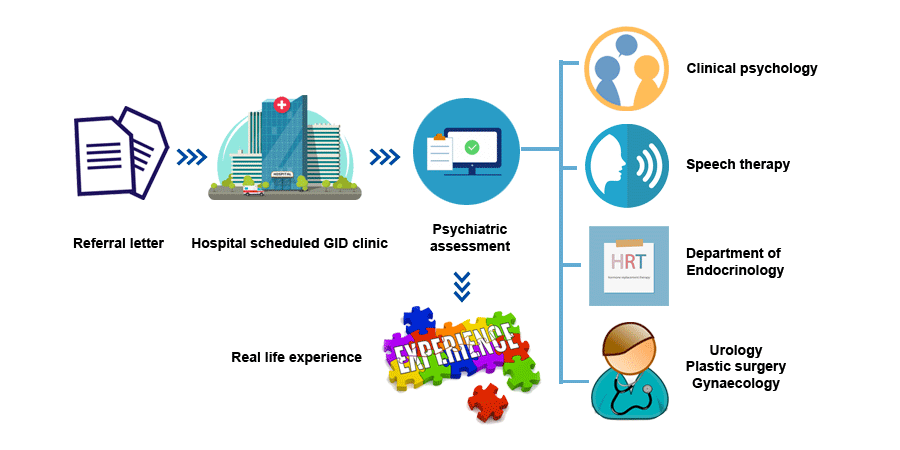


Equality・Diversity・Inclusion

 Public hospitals under the Hospital Authority provide medical care to patients with gender incongruence or gender dysphoria. Governance often involves cross-disciplinary health care teams, including psychiatrists, surgeons, endocrinologists, clinical psychologists and other full-time medical personnel. Psychiatrists, clinical psychologists and other full-time medical personnel in the team will fully assess patients with gender incongruence or gender dysphoria, so as to adopt appropriate psychiatric, Internal Medicine and/or surgical treatment, as well as the counselling services required by the patient. Treatments may include internal medicine under the supervision of an endocrinologist and gender reassignment surgery. Before undergoing gender reassignment surgery, patients are required to have a real life experience with their desired gender for a specific period of time.
Public hospitals under the Hospital Authority provide medical care to patients with gender incongruence or gender dysphoria. Governance often involves cross-disciplinary health care teams, including psychiatrists, surgeons, endocrinologists, clinical psychologists and other full-time medical personnel. Psychiatrists, clinical psychologists and other full-time medical personnel in the team will fully assess patients with gender incongruence or gender dysphoria, so as to adopt appropriate psychiatric, Internal Medicine and/or surgical treatment, as well as the counselling services required by the patient. Treatments may include internal medicine under the supervision of an endocrinologist and gender reassignment surgery. Before undergoing gender reassignment surgery, patients are required to have a real life experience with their desired gender for a specific period of time.

The different kinds of transgender healthcare services
In general, patients will receive mental and psychological assessment at the beginning of treatment, as well as basic physical examination and hormonal test under the arrangement of the medical team. Team members will decide whether the patient is suitable for a variety of related treatments based on his/her clinical situation and personal wishes.
Real life experience
Over a period of 12 to 24 months of real-life experience, patients follow their chosen gender roles to invest in every aspect of their life. The therapist will expect the patient to demonstrate a good ability to adapt to the gender role he or she chooses, both professionally and in interpersonal relationships. The actual life experience of the treatment can be extended in some cases.
Psychotherapy
Psychotherapy is a necessary course of treatment that can guide the patient to self-assess, explore and confirm feelings about gender identity, and help the patient decide whether he or she is willing to start an irreversible treatment program or choose other coping methods. During the transition period, psychotherapy can help patients to truly assess the changes caused by the treatment, and other/their future life benefits and disadvantages, and help patients take responsibility and enhance their ability to adapt to change.
《More information about Psychiatrist》
Hormone replacememt therapy (HRT)
The hormonal treatment will begin with the consent of the attending doctor and the patient. Patients are fully informed and explained about the risks and benefits of receiving hormonal therapy. The patient may be required to undergo a physical examination and blood test to assess whether his/her physical condition is suitable for the prescription of hormonal drugs.
Gender affirming surgery (or gender reassignment surgery)
With the consensus of the medical team and the patient, patients who have completed the real-life experience of the treatment process and are interested in undergoing sex reassignment surgery will be referred to the surgeon. The surgeon will determine whether the patient is suitable for surgery based on his/her individual clinical situation.
